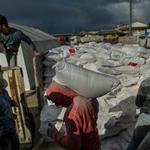Niche small States in humanitarian diplomacy: Qatar’s positionality in the protection ecosystem
Humanitarian diplomacy emerged as a concept in the 2000s to describe the vital work effected by non-State humanitarian organizations to negotiate access, protect civilians and uphold humanitarian principles. This paper charts the rise of State-led humanitarian diplomacy in the Middle East, arguing for the need to expand the conventional lens that is focused on non-State actors. It does so through a detailed examination of Qatar, a case study that has emerged over the last two decades as a significant State actor engaging in a range of forms of humanitarian diplomacy.
Following a brief theoretical examination of the concept of humanitarian diplomacy, the paper describes Qatar’s role in humanitarian diplomacy in relation to the changing context of armed conflict and humanitarian response in the Middle East. It then presents a categorization of Qatar’s humanitarian diplomacy, employing a framework structured around multiple levels including practice, policy and normative/ideational, carried out by both non-State and State actors. Finally, the paper reflects on the significance of Qatar’s experience and the implications it may have on the conduct of humanitarian diplomacy in the region, and in particular what a niche small State can do to contribute to the protection of the humanitarian sphere.
https://doi.org/10.1017/S1816383124000602


